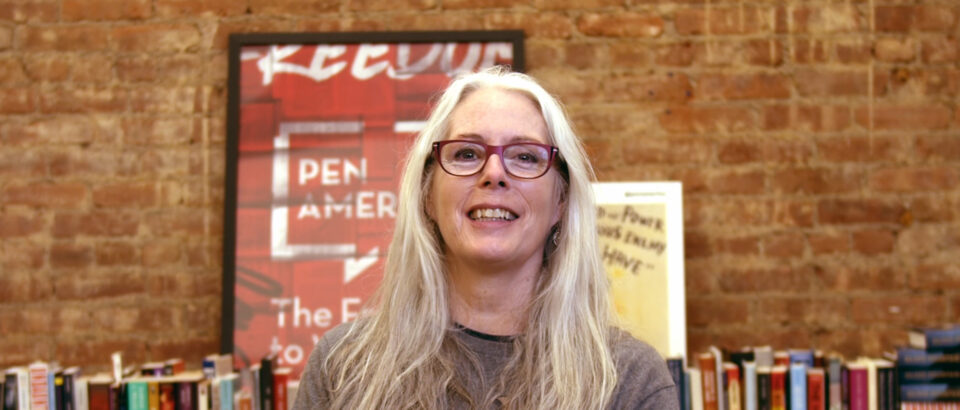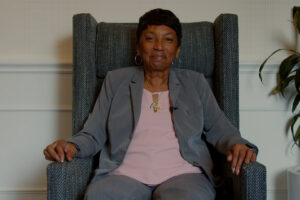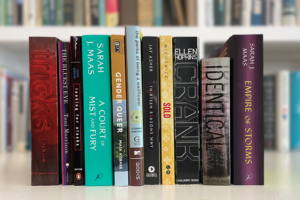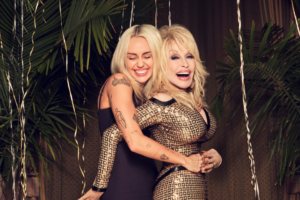Laurie Halse Anderson: Speaking for the Voiceless

Nov. 21, 2023
Laurie Halse Anderson’s celebrated young adult novel Speak tells the story of Melinda, a high school student who stops speaking after a sexual assault. Speak was a National Book Award finalist. It was also an immediate target for censors.
The book has appeared on the American Library Association’s list of most challenged books since its publication in 1999. In the 2022-2023 school year, Speak and its adaptations were banned 14 times, according to PEN America’s Index of Banned Books. Her other books were banned 13 times.
It took more than 20 years for Anderson to write that she was raped at the age of 13, something she revealed in a memoir, Shout. It begins: “This is the story of a girl who lost her voice and wrote herself a new one.”
Early on, challenges to Speak usually came from a single parent, and more often than not, the parent would withdraw the objection after reading the book. “But now things have changed, shockingly, and dramatically,” Anderson said.
This year, Anderson won the highest honor for children’s literature, the Astrid Lindgren Memorial Award, which comes with a gift of 5 million Swedish kronor, or about $500,000. Anderson donated $100,000 of that prize to PEN America, saying the organization is “making the most profound difference in the United States right now defending all of our right in the Constitution, defending the First Amendment, defending the rights of writers and artists, and the rights of children and families and everybody to choose the books that they want to choose to read.”
We spoke to Anderson, who has a historical fiction middle-grade novel out next year called Rebellion 1776, about censorship and the danger of trying to protect kids from reading stories that reflect their realities.
This interview has been edited for length and clarity.
What made you want to write about the experience of sexual assault?
I started writing Speak back in 1996, back when my oldest child was almost 13. When I was 13, that’s when I was raped. Actually, the book started in a nightmare. I had a bad dream one night about a girl sobbing and it often takes me a little bit to catch up to what my unconscious mind is doing. But I think my unconscious mind was letting me know it was time to work through this. So that’s when I began to write Speak, based on that girl in my head who was sobbing, who had a story that she couldn’t tell.
Speak isn’t exactly what happened to me. I wasn’t ready to do that publicly yet. But it goes into a lot of the same feelings that I had, which makes the book little bit larger than a book about sexual assault. I think a lot of teenagers find in the book a little bit of a roadmap for how they can find the courage to speak up when a bad thing happens. Too often, bad things happen to our children.
When I was attacked, just at the beginning of ninth grade, I hid in the library. I forgot to go to class, I got high a lot. I did all the kinds of things that people who are trying to struggle through a traumatic experience do. Reading, even though there weren’t any books about my experience, but the act of reading, the act of going into that safe sanctuary in the library, that’s what kept me alive through those years.
“The act of reading, the act of going into that safe sanctuary in the library, that’s what kept me alive through those years.“
What does it say to you, when people try to silence your voice?
When people are trying to ban my books, it’s because they feel I’m talking about sex in a way that’s inappropriate for children, and they qualify children as being under age 18. What’s really inappropriate are adults who are unwilling to talk to kids about the realities of the world. Every parent I’ve ever met has taught their children how to safely cross a road, right? Would anybody ever say, “Well, I don’t know. I’m not going to teach my kid about crossing the road safely, because I don’t want them to be afraid that they could be hurt?” No, that’s ridiculous. That’s ridiculous. One out of every three people who identify as female in the United States have been victims of some form of sexual violence. One out of six people who identify as male in the United States have been victim of some forms of sexual violence. And our siblings, our community members who identify outside of those traditional binaries, they have much higher rates of sexual violence as well. It’s part of life – 93% of the children, people who are aged younger than 18, 93% of them were harmed by somebody that they knew.
What it says is we don’t know how to talk to our kids. This is what I see, not only in the censorship of my books, but the censorship of my books that are written by friends who are black or brown or books about the history of race in the United States, books who are written by and about people who are gay or trans or outside that very narrow identity group that wants to control the entire country. They think they’re shielding their children; what they’re actually doing is they’re making their children more vulnerable. And they’re making all the kids in their community more vulnerable, despite the wishes of other families.
There’s always at the core, I feel, of any censorship movement, a loving group of adults who care about their kids. And I love those parents. I respect and honor them, because I understand how hard it is. But what has made me incandescently angry, as an American, as a writer, is that those normal fears of people raising children are being manipulated by dark forces for their own financial and political ends. And that’s how you destroy democracy. They’re working hard at it.
Moms for Liberty has said that Speak shouldn’t be taught in high schools because it might make boys feel bad. What do you think of that idea?
I have learned so much from America’s teenagers. And there was one question I kept getting from boys everywhere, which tells you something. Usually it was a boy sitting the back of the room – big guy, probably an athlete. And he would say, “Miss, I liked your book.” But then he would get to the real question, and he would say, “but I didn’t understand why she was so upset.” And the first dozen times I heard that, I wanted to ask the young man for his parents’ phone number because I needed to have a conversation with them. But then I kind of dropped my judgment, and I listened harder, and I gave him more space. And they all said the same thing. They said “why would something that just takes a couple minutes, be upsetting her for months and months and months? I just don’t get it.”
And they taught me so much with that question. When I explained to boys and entire classes that sexual trauma, trauma from sexual assault or any kind of violence can last a lifetime – can have generational impacts. People who are victims of sexual violence tend to have lower educational accomplishments. Often if they’re raped in or otherwise harmed when they’re in college, they’ll drop out, their lifetime earnings fall, they often fall into depression and deal with mental illness for the rest of their lives. And when you explain these things, especially to the boys in these classrooms, an amazing beautiful thing happened. First of all, they were kind of shocked. And then you could see them shift gears in their souls. And instead of being a young man saying something that might sound very ignorant, they would shift into that protective mode, like, “Oh, I’m not going to let this happen on my watch. I’m going to make sure that I tell my friends about this. I’m going to make sure that the girls in my life or anybody in my life, that’s not going to happen because I’m going to do what I can to stop it.”
And to watch somebody go from not understanding a problem to acknowledging that, learning about the problem and then figuring out how they can be a solution to the problem – that’s why teenagers are such outstanding human beings. And that’s why it is so critical that they have access to books, all the books that allow them to work through what the real world is, before they are facing it. When you read, you develop empathy. When you read, you develop your soul. When you read a book, you connect with the page, you connect with yourself. And if you share a book, you connect with another person. I watched those boys in those classrooms grow into men, right in front of my eyes.
“When you read, you develop empathy. When you read, you develop your soul.”
Do you have a message for kids who can’t access your book?
I’m thinking of one person who had been molested by a family member for several years as that person was entering puberty. And finally read my book and realized, “Oh, oh, oh, I don’t have to do this anymore.” She thought that there was something wrong with her, that she had been singled out because there was something wrong with her. And the conversation that no sadly, this happens to so many people, and that we need to be speaking up about this – that was a conversation that changed her life.
There are so many great books about sexual violence. But when we take them away from children, we are stealing from them. We are stealing their opportunities to grow up healthier, to grow up sane, to grow up strong. We are harming children, when we withhold the truth of the world from them.
Does the book banning movement affect your own creative process?
This current crisis has been devastating. I think for me and all of my friends who are writers, we’ve seen our incomes absolutely plummeting. There’s this myth that if your book gets banned, you sell more copies. No, that’s a lie. And I don’t think any of our incomes will ever recover, to be honest with you. We used to visit schools and be paid for that, to teach kids about creativity and writing. Those have completely dried up. So there’s that practical financial thing, but also when people call me a pornographer, and sometimes a pedophile, that kind of eats at your soul. I found myself asking the big questions like, has it been worth it? And what am I supposed to be doing now? We have a very supportive community in children’s literature. So we’re trying to help each other and seeing the support from organizations like PEN America, National Council of Teachers of English, American Library Association, that helps, too, but some days are hard.
What would you say to that person that says, the arts are under attack, and thinks about giving up their passion?
I believe in a loving God. I believe that the universe cares for us. And if you have a seed in your soul that makes you hunger to create something, whether that’s music or dance or art, or write stories or poems, songs – you were given that for a reason. You have some stories to tell. And in dark times, your stories are light. I’ve seen books that were made underground in the Soviet Union and passed hand to hand to hand to hand because those stories, when their government was destroying their systems of humanity in those countries, it was the stories that were the lights that people warm their hands by, and they shared soul to soul. So it’s hard now. It’s hard for everybody. If you have the desire, you have the gift. Frankly, you’re being called. You are being called by the world to tell your story. We need your story. We need you on the page. We need you in our ears. Please, please don’t give up hope because you are our hope. Keep writing.
Lisa Tolin is PEN America’s editorial director. Damarcus Adisa produced the video.

The Resistance: How George M. Johnson’s Family Stopped a Book Ban

The 11 Most Banned Books of the 2022-2023 School Year


